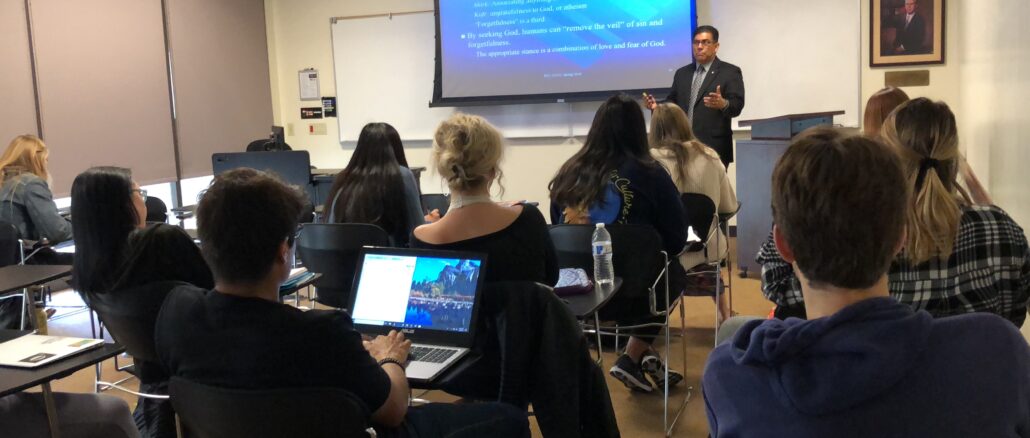
Pepperdine professors believe the required religion courses are integral to preparing students for lives of service, purpose and leadership.
Students aren’t so sure.
A Pepp Post poll of 60 students found that 75 percent of students believe the required religion courses helped them to understand the Bible and 72 percent found that the required religion courses helped them to understand Christianity. But 27 percent believe the required religion courses were a waste of time.
“There was one kid, I don’t remember what his religion is but he raised his hand on the first day of class and asked the professor if he really expected him to read the Bible,” said Ema Selesia, a first-year undeclared. “It seemed that by the end of the semester he was one of the students that enjoyed the class the most and had learned the most.”
Student opinions varied based on their beliefs. But professors believe the required religion courses are important to understanding the importance of Christianity in the world today.
The required religion courses
Pepperdine offers three required religion courses. They are Religion 101, 102 and 301.
Religion 101 and 102 study the literature, history and theology of the Bible. Religion 101 is the Old Testament course and Religion 102 covers the New Testament.
Religion 301, titled Christianity and Culture, studies the intersection of Christianity and various aspects of culture from art and literature to politics and race.
Religion professors said Religion 301 varies widely depending on professor and that students should look up the course topic before they enroll.
Students can opt into Religion 526, World Religions, which counts for the world civilization General Education course.
“The reason we have these classes is because it seems to be the historic precedent at all faith based schools,”said Daniel Rodriguez, divisional dean of Religion and Philosophy. “They want students to be informed about the faith tradition their school is associated with.”
Students rated how beneficial they found all three of the required religion classes on a five-point scale. More than 50 percent of students surveyed rated all three classes as beneficial to very beneficial, with Religion 102 leading. Less than one third of students said the religion classes were not beneficial.
Why these courses are important
Professors said the religion courses allow students to dig deeper and challenge their beliefs.
Seaver College Dean Michael Feltner said students of all backgrounds learn things they didn’t understand before coming to Pepperdine in the required religion courses, even when they have been in church their whole life .
“I hear how the connections students have made in the way they have been forced to think deeply in a 301 class has really advanced their understanding and really helped them to see how to better integrate their faith with everything that they are going to do in their life,” Feltner said.
The religion courses also help students understand Christianity, God and the Bible.
“Even if they don’t embrace it, we want them to understand the Christian worldview assumptions,” Rodriguez said. “One of the assumptions we hope students will at least understand if not embrace is that there is a God, and that he created us and that we have a purpose.”
Professors incorporate faith in all classes taught at Pepperdine, Feltner said.
“The co-curriculum program that we offer really gives a way to nurture faith and spiritual development in students, so that students of all faiths and of all denominational affiliations within a Christian faith are hopefully able to leave here either more confident in their faith if it’s a Christian faith, have a deeper understanding of that faith, and if they are of another faith heritage hopefully they leave with a better understanding of this foundation of Christian faith,” Feltner said.
Religion professors hope that students will grow in their faith in these classes and learn how to apply their faith in whatever they choose to do after graduating from Pepperdine.
“You can compartmentalize your faith as something you reserve for Sunday morning and you can reject without investigation or evaluation some of the claims that are made by scholars about the history of Christianity and the sources of these texts,” said David Lemley, a religion professor specializing in ministry who teaches Religion 301. “What I think our classes are meant to accomplish is that when you encounter those kinds of challenges, you can say, ‘I knew that.’”
Lemley said the religion classes help meet the goals that George Pepperdine laid out in his mission statement. George Pepperdine wanted students to understand what Christian life is and what Christianity has to offer.
Both Lemley and New Testament Professor Randall D. Chesnutt argued that students needed to understand Christianity’s role in shaping Western culture and understand its continued relevance in the world today.
Chesnutt said the religion courses inform students how people of faith think and make decisions. He hopes that students are able to benefit from these classes and ask themselves, “am I a better informed person, am I qualified to understand the world in which I live and how people think and where they are coming from, whether or not they come from a Christian perspective.”
Students background shapes opinion
Students surveyed come from a variety of Christian backgrounds, with non-denominational Christians leading the pack.
The required religion classes force students who come from a religious background to challenge their already established beliefs by understanding the historical context of the Bible.
“A common critique comes from people who read the Bible devotionally and come here and feel like their faith has been deconstructed,” Rodriguez said.
Some students who don’t come from a religious background feel pressure to convert to Christianity.
Lemley said he experiences many students who come into his classes with a variety of religious backgrounds, and whether they are religious or not does not determine if the student has a positive learning experience or is invested in the class.
“Some students say, I didn’t have an appreciation for religion before I began to see why it mattered to the people we talked about in class, or I didn’t think that Christianity or Jesus were relevant or useful to people in contemporary life and now I can articulate why someone would believe this and why it is a good way of life,’” Lemley said.
Student opinions
Student opinions on these required religion classes vary. Some benefited from taking these classes and some believe they did not.
Senior communication major Audrey Altman has completed all three of the required religion courses.
She described the religion courses at Pepperdine as telling the story of Jesus.
“Whether or not you chose to believe that Jesus was the son of God or not, I mean it’s almost like a history course in that sense,” Altman said.
Selesia also has a positive outlook on the required religion courses.
“Even if you are not someone who has a strong faith or wants to grow in your faith, it’s good just to understand it because it will give you an understanding to see other people’s worldviews and to have a deeper understanding of the whole world,” Selesia said.
Sophomore psychology major Sofia Gadegaard has a different perspective.
“As an international student who doesn’t have any Christian background or upbringing, the religion classes are hard to connect with,” Gadegaard said. “I feel that I am unable to contribute in class as much as I would like, simply because I do not have the prior cultural and religious background unlike many of my peers. I do however, also enjoy learning about Christianity because it expands my understanding of the people around me, and also more about the historical context behind the texts of the Bible.”
Gadegaard said three required religion classes is a lot of added work on top of the other GE classes.
Junior business major Joshua Perkins, who comes from a Christian background, found the religion courses easy.
“I don’t feel like it benefited me personally because I already knew everything I was being taught but for somebody who is coming from a non-religious background who wants to learn more about religion in general, I think it would be very beneficial,” Perkins said.
While Perkins finds these courses easy, he also believes the religion courses should be required for everyone because Pepperdine is a Christian college and he believes Pepperdine is allowed to require these courses and Convocation.
Chesnutt said he understands student critiques about having to take required religion classes but believes professors have to decide what GE courses students need to be a well-rounded adult.
“Given a choice students would probably not take a math course or would not take a science course and would not take a humanities sequence, and yet those things have been judged to be important,” Chesnutt said.
Dani Masten completed the reporting for this story under the supervision of Dr. Christina Littlefield and Dr. Theresa de los Santos in Jour 241 in spring 2018. Dr. Littlefield supervised the web story.




